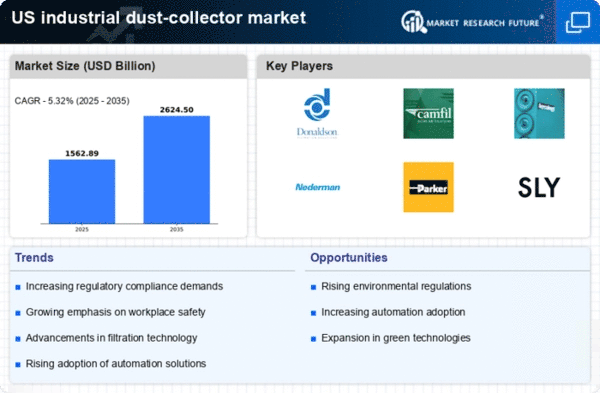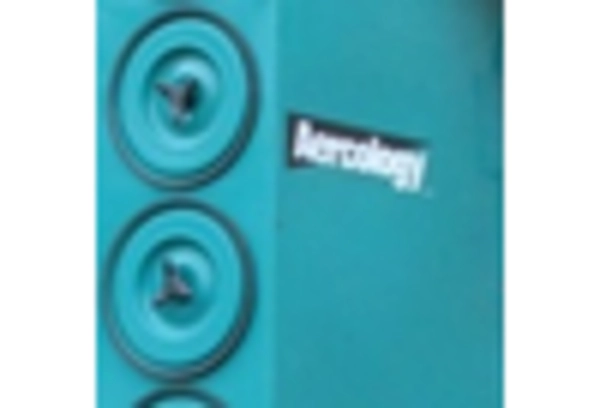Growth of the Manufacturing Sector
The industrial dust-collector market is benefiting from the robust growth of the manufacturing sector in the US. As manufacturing activities expand, the generation of dust and particulate matter increases, necessitating effective dust-collection systems. The US manufacturing sector has shown resilience, with a projected growth rate of 3.5% annually, which directly correlates with the demand for dust-collection solutions. Industries such as automotive, aerospace, and metalworking are particularly reliant on efficient dust management systems to maintain operational efficiency and comply with environmental regulations. This growth trajectory suggests a sustained demand for advanced dust-collection technologies, positioning the market for continued expansion in the coming years.
Emergence of Eco-Friendly Practices
The industrial dust-collector market is increasingly influenced by the emergence of eco-friendly practices within various industries. Companies are adopting sustainable manufacturing processes that prioritize environmental responsibility, leading to a demand for dust-collection systems that minimize waste and energy consumption. The shift towards greener practices is not only driven by regulatory requirements but also by consumer preferences for environmentally conscious products. As a result, manufacturers are investing in dust-collection technologies that utilize energy-efficient designs and recyclable materials. This trend is expected to contribute to a market growth of approximately 5% annually., as businesses seek to align their operations with sustainability goals while ensuring compliance with environmental standards.
Rising Industrial Emissions Regulations
The industrial dust-collector market is experiencing growth due to increasing regulations aimed at controlling emissions from manufacturing processes. In the US, the Environmental Protection Agency (EPA) has implemented stringent standards that require industries to minimize airborne pollutants. This regulatory environment compels manufacturers to invest in advanced dust-collection systems to ensure compliance. As a result, the market is projected to expand, with an estimated growth rate of 5.5% annually. over the next five years. Companies that fail to adhere to these regulations may face substantial fines, further driving the demand for effective dust-collection solutions. The need for compliance not only enhances workplace safety but also promotes environmental sustainability, making it a critical driver in the industrial dust-collector market.
Increased Focus on Worker Health and Safety
The industrial dust-collector market is being propelled by a heightened focus on worker health and safety. Organizations are increasingly recognizing the detrimental effects of dust exposure on employee health, leading to a demand for effective dust-collection solutions. The Occupational Safety and Health Administration (OSHA) has established guidelines that necessitate the implementation of dust control measures in various industries. This regulatory push, combined with a cultural shift towards prioritizing employee well-being, is driving investments in dust-collection technologies. Companies are likely to allocate budgets towards upgrading their systems to ensure compliance with safety standards, which could result in a market growth of around 4.8% over the next few years. The emphasis on health and safety not only protects workers but also enhances productivity and reduces absenteeism.
Technological Advancements in Filtration Systems
Technological innovations are significantly influencing the industrial dust-collector market. The introduction of advanced filtration technologies, such as HEPA and electrostatic precipitators, enhances the efficiency of dust collection. These systems can capture particles as small as 0.3 microns, which is crucial for industries like pharmaceuticals and food processing. The market is witnessing a shift towards more efficient and automated systems, which can reduce operational costs and improve air quality. As industries increasingly prioritize health and safety, the demand for high-performance dust-collection systems is expected to rise. This trend is likely to contribute to a market growth of approximately 6% annually, as companies seek to upgrade their existing systems to meet higher standards of air quality and operational efficiency.
















